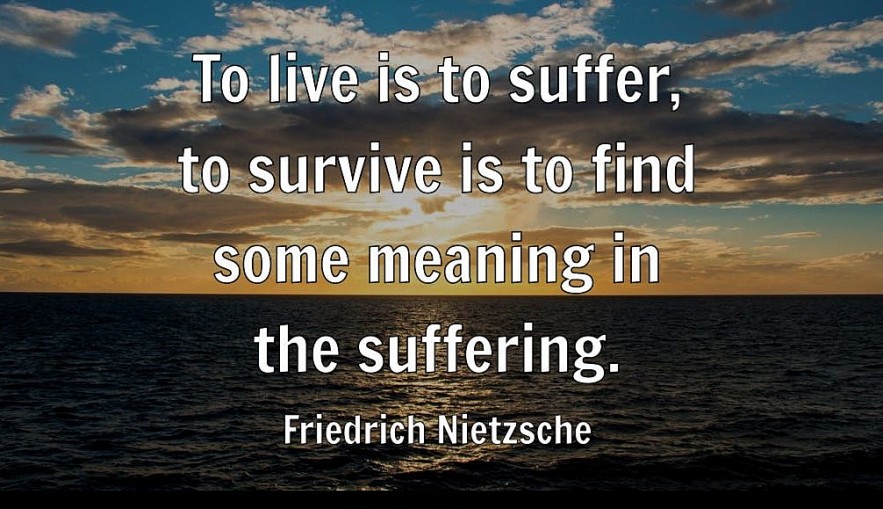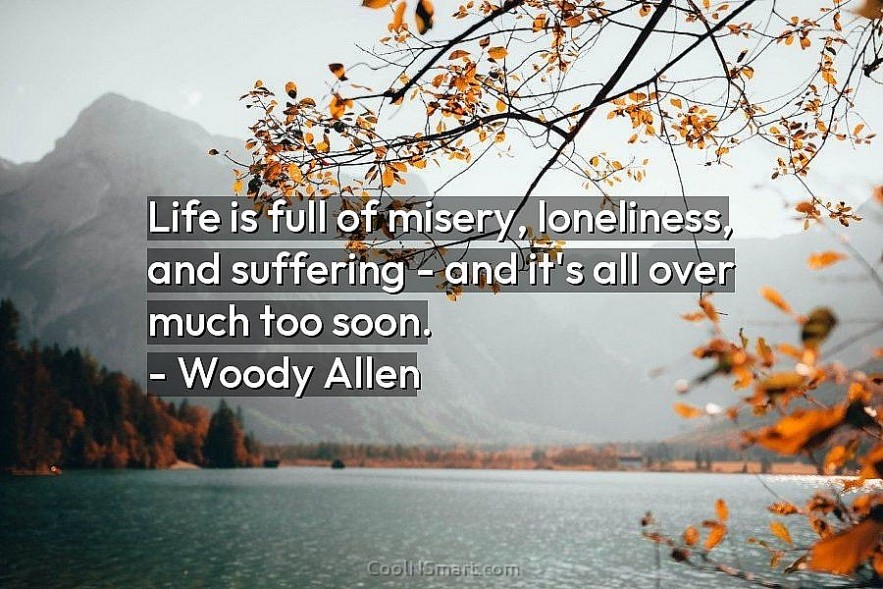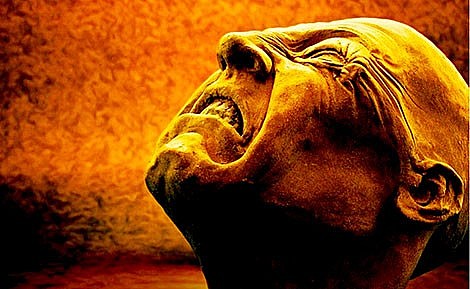Life Was Full of Suffering And If We Were Never Born…
♦ Tree of the Knowledge of Good and Evil: Symbolism, Meaning and Unique Facts
♦ How Old Is The Earth In Science, Bible
 |
| To live is to suffer, to survive is to find some meaning in the suffering - Friedrich Nietzsche |
Raphael believes it was a mistake. This life is a full of suffering or the valley of tears , and he did not ask to be born.
He is not an unhappy or boring person to the point of not wanting to live: "I love my parents, and my family is warm. My life is not worth complaining, but I still feel there is no reason to. I don't have to live, go to school, get a job, because I don't want to be in the world."
If you ever think about this, then like Samuel, you are not alone. Novelist Gustave Flaubert, author of "Mrs. Bovary", once stated that he would curse himself if he became a father, because he "didn't want to pass on to anyone the burden and the disgrace of being alive."
Writer Fyodor Dostoyevsky looked at life even more bleak, when he wrote in his immortal work The Karamazov Brothers: "I would rather kill myself in the womb, so as not to go out into this world".
German philosopher Arthur Schopenhauer is particularly pessimistic on the subject: "Does a person who sympathizes with future generations let them shoulder the burden of existence, or at any cost deliberately not taking responsibility for that burden?"
Anti-natalism, a small corner of modern philosophy, posits a similar idea: If this life is inherently miserable, is existence really happier than not being happy?
This is a very delicate matter, since its point of view runs counter to our basic biological impulses (reproduction is about perpetuation, continuity), but it's also something worthy of attention. , because it gets to the bottom of a painful philosophical question: Is this life worth living?
Life Was A Valley of Tears
 |
| Life is full of misery, loneliness, and suffering |
David Benatar, currently Dean of the Faculty of Philosophy at the University of Cape Town (South Africa) and one of the key founders of anti-proliferation theory, thinks the answer is NO. According to him, there is a serious asymmetry between the good and the bad in this life.
Benatar gives an example: When he thinks about Mars, instead of regretting that the planet lacks great things, he feels positively that because life does not exist, it simply is The planet is free from suffering.
Imagine trying to buy a ticket to see a movie, walk into the theater with an expectant attitude, and then be disappointed because the movie is bad. If you knew in advance that the movie wasn't what you expected, you probably wouldn't have wasted your time.
The Buddhist scriptures also have a very vivid life story. A death row inmate escaped and was sent out quickly. While fleeing, he fell into the abyss, but managed to cling to a climbing branch and just like that, hovering over the cliff.
I thought it was lucky, but it wasn't: There was a black mouse and a white mouse gnawing on the vine he was clinging to. Above, the pursuing military officers chased the place. And at the bottom of the cliff, the viper waits with its head raised.
In that desperate situation, the death row inmate suddenly saw another tree branch above his head. A swarm of bees were nesting on it, and suddenly a few drops of honey fell into the death row inmate's mouth. At that very moment, all his troubles seemed to be gone. Only the sweet nectar remains in the mouth.
| Life is full of misery, loneliness, and suffering – and it’s all over much too soon. – Woody Allen |
Drops of honey are metaphors for momentary pleasure. Two black and white mice represent day and night, gnawing our lives slowly. There is nothing we can do about the ultimate end, which is death. When the sweetness is over, the death row inmate will be even more saddened and hurt by the situation he is in.
That is the basic point of Buddhism: The nature of life is suffering. Not only in the narrow sense that what people generally perceive as bringing suffering (eg physical pain, torture, humiliation...) but only a broader state, when people live with the attitude of suffering (suffering) reality, because they are only focused on pleasure (with metaphors of honey drops), thereby being deceived and unable to be satisfied with what they have.
It is unacceptable that this life is impermanent, ever-changing, and that everything is temporary, until we pass away.
Harsh Truths
We each have an average of 30,000 days to live, and here are a few harsh truths that all will have to face:
Everything perishes. It sounds obvious, but you're bound to feel a pang when you look back and feel it. Everyone gets old. One more day is another step on the journey to death. Your parents used to guide you to take the first steps, now you are the one to guide them. And so will you and your children later on.
Childhood friends grow up to be bland, possibly becoming total strangers. First love will often fall apart, leaving regrets even years later. And the flower on the porch, too, a beautiful morning, the next morning has withered.
Most people will let you down. One study found that 60% of people surveyed confessed that they had shared their best friend's secret with a third party.
This is disappointing: We can hardly trust anyone completely. The child you expect will often not be what you want, because he will live his life. The people we love the most often don't love us. The person you trust the most can betray.
The meaninglessness of life. Difficulties seem to be an essential part of this life, but the most frightening thing is its meaninglessness, if we look at it more broadly, beyond personal prejudices, above both love and small life.
Every child who joins the journey of life begins with innocence, then grows up and struggles with common concerns of life, such as money, status, relationships, effort, disappointments .
Like I used to be. But then what does it mean? All we do, all our joys and sorrows, the people we either love or hate, one day we have to "let the wind blow", as Bod Dylan sang.
The loneliness of life. You have to accept that soulmate is probably for the most part just a concept in literature or cinema, the rest is basically that we can't understand each other. Although sometimes we suddenly find ourselves empathizing with someone, but that is not enough for each individual to be less lonely at night, with a very unique life, deep feelings that have never been found anywhere. .
You will never be satisfied. In the famous book Homo Sapiens (A Brief History of Humankind), Israeli professor Yuval Noah Harari talks about the brain mechanism inherited over millions of years that explains why we will never be happy.
 |
| Life Was A Valley of Tears |
Millions of years ago, people just wanted to have enough to eat, and less disease. After the agricultural and industrial revolutions, people have solved these basic problems, but it is not enough.
The 21st century is the century of ambition to conquer nature, and strive for immortality. That is, enough to eat and a long life is not enough. People also want the power of the gods. That dissatisfaction is a characteristic formed through evolution, turning humans into a species that dominates the earth.
When you don't have money, you think money is happiness. People with money but no health just hope that they no longer have to stay in hospital beds. A person without love can only think that the person he loves is everything. We always hope, and when we achieve it, we start to be disappointed.
The brain's mechanism is like that: Humans will never be eternally happy. It is our driving force in life, and also our beautiful suffering.
When we were present in this life
Alain de Botton, an English philosopher and writer best known for his best-selling book "The Consolation of Philosophy", once wrote about a psychological state that occurs when people think about the suffering nature of life. Lives in the essay "Praise of Heartbreak": "Sorrow is not a rage or bitterness, but a noble form of sadness that arises when we realize that pain and disappointment are It is not a disorder to be cured; it is a tender, calm, dispassionate acknowledgment of how much pain we are bound to experience."
Karl Pillemer, Professor of Human Development at Cornell University, conducted experiments on 1,200 people aged 70-100 and drew a conclusion: "In the field of gerontology, there is a theory called 'choosing' social emotions".
What they argue is what distinguishes people 70 and older from younger people is a sense of time constraint. You are truly aware that your days are counting down. Instead of getting discouraged, people started making better choices."
To question whether being born into this world is worth it does not mean belittling living beings and lowering the value of life, but so that we can once reflect on the value of life. this existence, through a contrasting prism.
That can make us even better, once we can accept "gently, calmly, carefree" the harsh fact that we were born, and have no choice but to choose one.
And at some point, I feel a bit sad because those who have joined this life with me, regardless of status, rich or poor, fame, all have a common suffering on the tree of life, on the same ground. the way to the other side of the world. It is perhaps a beautiful sadness, more beautiful than never having been born.
 Good Friday in the Bible: Definition, History, Meaning, Traditions and Facts Good Friday in the Bible: Definition, History, Meaning, Traditions and Facts Check out the history, meaning, traditions and facts of Good Friday in the Bible. |























